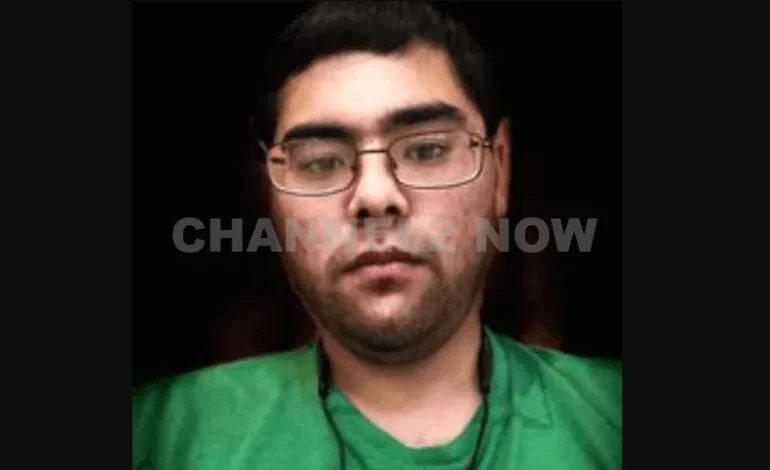
Michigan Man Arrested on Federal Charges for Threatening Mass Shooting Against Christians if Trump Wins 2024 Election: 25-Year-Old Isaac Sissel Allegedly Planned to Use Stolen AR-15 in Attack; FBI Intervenes Following Alarming Threat Intercepted Online
Michigan Man Arrested on Federal Charges for Threatening Mass Shooting Against Christians if Trump Wins 2024 Election: 25-Year-Old Isaac Sissel Allegedly Planned to Use Stolen AR-15 in Attack; FBI Intervenes Following Alarming Threat Intercepted Online
Michigan Man Charged with Threatening Mass Attack Against Christians if Trump Wins Election, FBI Intercepts Online Threat and Apprehends Suspect in Swift Response
Ann Arbor, Michigan—Federal authorities have arrested Isaac Sissel, a 25-year-old resident of Ann Arbor, Michigan, after he allegedly made violent threats to carry out a mass shooting against conservative Christians if former President Donald Trump wins the 2024 election. The threats, intercepted online by the FBI’s National Threat Operations Center, have sparked a wide-ranging investigation and underscore the ongoing efforts by federal authorities to prevent acts of politically motivated violence.
The arrest was announced today by United States Attorney Dawn N. Ison, in coordination with Cheyvoryea Gibson, Special Agent in Charge of the FBI’s Detroit Field Division. Sissel is charged with issuing a threatening communication, a federal crime carrying severe penalties. As details emerge, the case sheds light on the FBI’s swift response to potential mass violence and the complex dynamics of politically charged threats in an election year.
Details of the Threat: Chilling Message Intercepted by FBI
According to the federal complaint filed in court, the threatening communication was intercepted by the FBI on November 2, 2024. The FBI’s National Threat Operations Center, located in West Virginia, received the anonymous online message, which quickly raised alarm due to its specificity and violent language. In the message, Sissel allegedly declared his intention to target conservative Christians if Trump were to win the election, referencing a stolen AR-15 rifle that he claimed to possess.
The message reportedly stated: “I shall carry out an attack against conservative Christian filth in the event Trump wins the election.” Sissel’s words underscored both a political and ideological motivation, as he framed his planned actions as retaliation against Christians aligned with conservative values. Further heightening the concern for federal authorities, Sissel added that he had devised a strategy to evade law enforcement detection, suggesting a level of premeditation and careful planning.
One excerpt from his statement read, “I have a stolen AR-15 and a target I refuse to name so I can continue to get away with my plans. Without a specific victim or ability to find the place I hid the gun, there’s not a thing the FBI can do until I complete the attack.” This chilling declaration revealed both an awareness of law enforcement’s potential challenges in tracing specific targets and an apparent intent to act with lethal force.
FBI’s Swift Response: Interception and Arrest
The FBI responded with urgency after intercepting the message, launching an immediate investigation into the source of the threat. Utilizing digital forensics and intelligence analysis, agents were able to trace the communication to Sissel’s location in Ann Arbor. Recognizing the potential threat to public safety, the FBI mobilized quickly, working with local law enforcement to secure an arrest warrant.
This morning, FBI agents apprehended Sissel at his residence in Ann Arbor. According to officials, the arrest operation was conducted without incident, and Sissel was taken into custody for questioning. He is expected to appear in federal court later this afternoon, where he will face formal charges related to the threat. Authorities have not yet disclosed whether the AR-15 Sissel claimed to have in his possession has been located or recovered as part of the investigation.
Federal Charges and Potential Penalties
The federal complaint charges Sissel with issuing a threatening communication, a serious offense under U.S. law. This charge is often applied in cases involving threats of violence against individuals or groups, particularly when those threats are linked to ideologically or politically motivated actions. If convicted, Sissel could face significant prison time, particularly given the nature of the alleged threat and its potential to incite fear within a targeted religious community.
Issuing threats of violence over electronic communications is a federal crime under statutes designed to protect public safety and uphold the integrity of the justice system. In cases involving threats against specific groups, federal prosecutors often pursue enhanced penalties due to the hate-based or ideologically driven nature of the offenses.
Background and Investigation: Who is Isaac Sissel?
As federal authorities investigate, more information about Isaac Sissel is expected to emerge. Thus far, little is known about his background, including any possible criminal history or affiliations with extremist ideologies. Investigators are probing potential links to political groups or online communities where anti-Christian or anti-conservative sentiments are discussed. The FBI will also investigate any potential accomplices or individuals who may have assisted or influenced Sissel’s alleged plans.
Neighbors and community members have expressed shock at the arrest, describing Ann Arbor as generally quiet and unassuming. However, they acknowledged that political tensions across the country have been at an all-time high, with fears that more isolated incidents of politically charged threats could materialize as the election draws near.
FBI’s Role in Monitoring Election-Related Threats
The FBI has ramped up its monitoring of online threats in recent years, particularly as the risk of politically motivated violence has risen. In preparation for the 2024 election, the FBI established protocols to quickly respond to threats that could disrupt the democratic process or endanger specific communities.
Special Agent in Charge Cheyvoryea Gibson addressed the public during a press conference, stating, “This arrest serves as a reminder of our unwavering commitment to ensuring public safety and protecting individuals from ideologically motivated violence. The FBI takes all threats seriously, particularly those that seek to instill fear based on political outcomes.”
The National Threat Operations Center, which intercepted Sissel’s alleged threat, plays a key role in the FBI’s broader strategy to identify and mitigate risks before they escalate. Operating as a national clearinghouse for tips and threats, the center employs a team of analysts trained to assess online communications and determine the appropriate course of action.
Political Climate and Rising Tensions
The 2024 presidential election has been a deeply polarized event, with heightened tensions across ideological lines. Former President Donald Trump’s reentry into the political arena has stirred passionate responses from supporters and detractors alike, with issues like religious values, immigration, and federal policy sparking divisive debates. The prospect of Trump’s potential return to office has generated a climate in which extremist elements may feel emboldened to act upon perceived grievances or biases.
Experts in political extremism caution that threats like those allegedly issued by Sissel are part of a larger trend. According to recent studies, the rise in ideologically motivated threats against specific communities has been accompanied by increasing instances of hate speech and politically charged rhetoric on social media platforms. Extremism analysts suggest that high-stakes events like presidential elections can be flashpoints for potential violence, particularly among individuals with entrenched grievances or radicalized views.
Broader Implications and Community Impact
For many in the Christian community, the alleged threat represents a disturbing example of targeted hostility and raises concerns about safety in the weeks and months ahead. Religious leaders and community advocates have expressed both relief that the threat was intercepted and apprehension over the ongoing risks associated with politically motivated violence. Many faith-based organizations are reviewing their security measures, particularly in light of recent violent incidents in places of worship around the country.
The case also highlights the challenges of safeguarding civil discourse and addressing radicalization. Experts agree that law enforcement agencies face a daunting task in monitoring potential threats without infringing on free speech, particularly as social media platforms continue to grapple with the spread of incendiary rhetoric.
Local churches and religious organizations in Ann Arbor have been notified of the incident, and some have already taken steps to increase security at their facilities. Christian groups in the area are working closely with law enforcement to coordinate any necessary security measures, and many have expressed their commitment to resilience and unity despite the attempted intimidation.
The Role of Federal Law and the Importance of Community Vigilance
This case underscores the importance of federal laws that allow the FBI to act swiftly in response to credible threats of violence. Federal charges of issuing threatening communications are designed to deter individuals from using intimidation to influence political or religious communities. By addressing these cases promptly, federal authorities hope to discourage others from making similar threats and to reassure the public that law enforcement agencies are committed to preventing violence.
Community vigilance is also essential in curbing the spread of extremist actions. Local organizations are encouraging residents to report any suspicious activity or concerning behavior to the authorities, emphasizing the role that civilians play in keeping their communities safe.
Conclusion: A Test of the Nation’s Resolve
The arrest of Isaac Sissel is a stark reminder of the challenges facing a divided nation. The political climate, marked by intense discourse and polarized views, has created an environment in which individuals with radical beliefs may feel emboldened to act upon their anger or grievances. As the country approaches the climax of the 2024 election cycle, this case serves as both a cautionary tale and a call for vigilance.
In the meantime, federal authorities remain committed to safeguarding the democratic process and protecting communities from ideologically motivated violence. The FBI’s actions, in this case, illustrate a proactive approach to addressing threats before they escalate into actual harm. By working with communities, monitoring emerging threats, and upholding federal laws designed to curb violence, the nation’s law enforcement agencies continue their work to promote security and stability.
As Sissel awaits his court appearance, the residents of Ann Arbor—and the nation at large—are reminded of the resilience and strength required to navigate these divisive times. The country’s democratic values, tested repeatedly, stand resilient against threats and intimidation, with a shared resolve to uphold safety, justice, and unity for all citizens.



